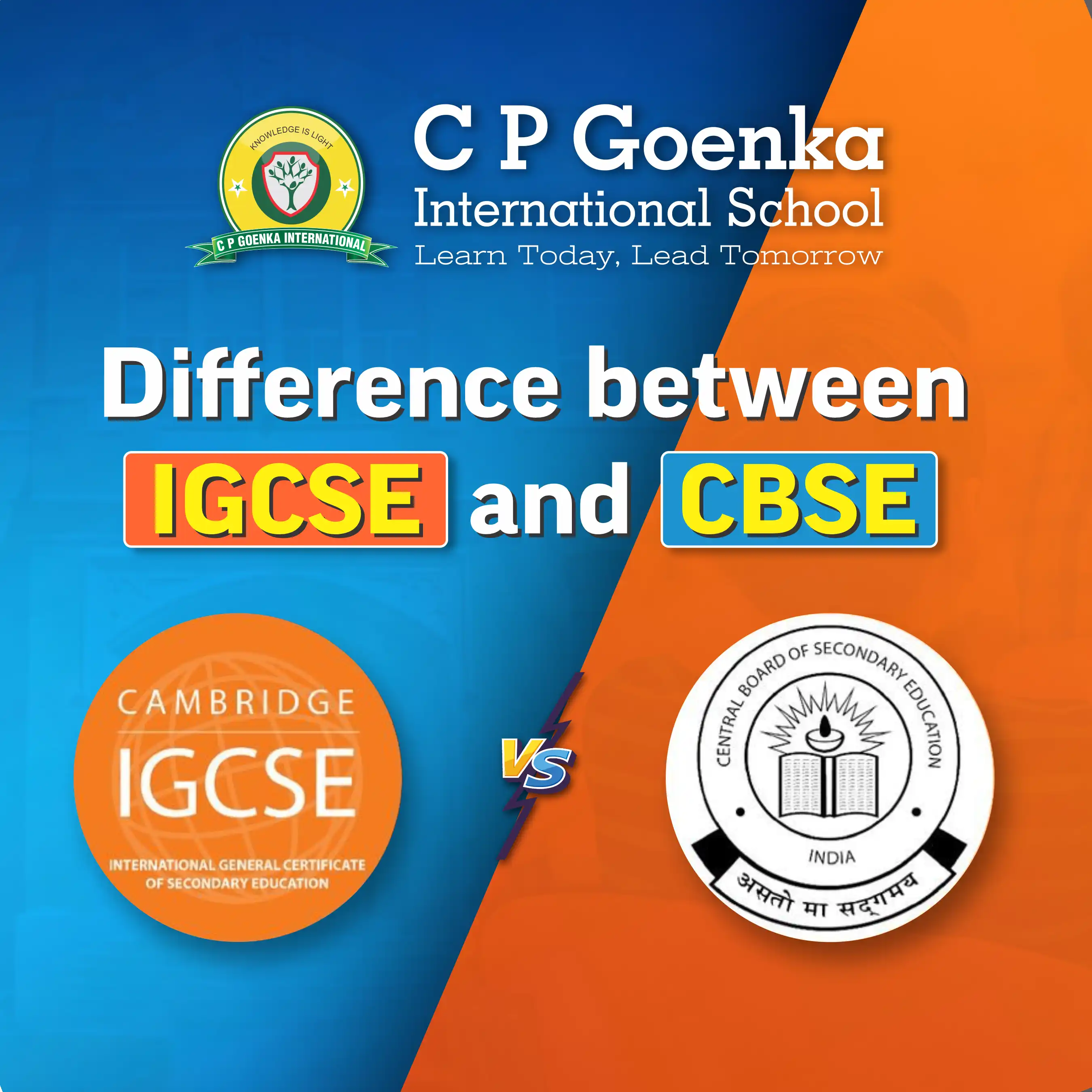
To Top
CBSE vs IGCSE
Parents only want the best for their kids, be it providing good food, shelter, or education. Therefore, choosing the best educational system is a serious concern among the kids’ caregivers. So, be it elementary school or secondary school, picking the most reputable and recognized educational board can make a huge difference in the child’s future career. Therefore, before signing up for a particular board, learn about its pros and cons and consider several factors.

A child’s caregivers are often confused between CBSE and IGCSE and which would have the most potential for helping the kid achieve career growth and success. While the CBSE curriculum is followed in many Indian schools, the IGCSE board is followed in global schools. In this article, we will learn about the key differences between CBSE and IGCSE in terms of learning approaches and salient features.
Salient Features of the CBSE Curriculum
The CBSE (Central Board of Secondary Education) curriculum, a common board followed in most Indian schools, takes a more centralized and structured approach toward education. Let’s take a look at its salient features.
- CBSE stands out from other boards because it allows educators to continue their studies anywhere in the country. That's because CBSE recognizes innumerable schools in India.
- CBSE is one of the most popular curriculums in India and is a common choice among parents from elementary school to secondary education.
- The CBSE curriculum only allows learners to choose their preferred subject combinations within their particular stream and not from other streams.
- CBSE focuses on learning and recalling the vital concepts in a theoretical subject. However, it does not usually cover every concept in depth.
- CBSE provides its own structured curriculum throughout the country.
Salient Features of the IGCSE Curriculum
The Cambridge IGCSE is a recognized board in many international schools worldwide, and it follows a more diversified and flexible learning approach. Here are its salient features.
- IGCSE provides a variety of subjects and combinations.
- Learners pursuing the IGCSE curriculum can enjoy flexibility by choosing their desired subjects across multiple streams.
- IGCSE is recognized worldwide, which means learners can use the most recommended IGCSE-recognized books and reference books.
- There is no set syllabus in the IGCSE curriculum.
- The IGCSE board helps with student’s overall learning and development. The board emphasizes developing creative, analytical, and critical thinking skills.
- The students pursuing the IGCSE board must apply the acquired knowledge in day-to-day life.
- The IGCSE curriculum is ideal for students who wish to study abroad since the board has an international standard and recognition.
Subject Differences Between CBSE and IGCSE
The CBSE curriculum provides a range of subjects in groups, also known as streams. Learners are allowed to choose subjects only from their chosen streams. English is compulsory across all three streams - science, commerce, and arts. However, the subjects of social studies, environmental studies, SUPW, and second languages are not necessary in CBSE.
On the other hand, the Cambridge IGCSE provides over 70 different subject options. Therefore, IGCSE students can choose their desired subjects with which they are comfortable or are passionate about. In other words, there are no restrictions for stream or subject selection. Each subject is designed to help the learners develop knowledge of global perspectives and research.
The difficulty level in CBSE vs. IGCSE depends on the child’s strengths and individual learning style. The CBSE curriculum is tailored to the Indian learning environment and educational context while focusing on the depth of understanding in a structured teaching framework. Whereas, the IGCSE board usually provides more flexibility and global recognition.
CBSE vs IGCSE: Teaching Methods
CBSE follows a more inquiry-based and collaborative learning approach. It allows students to work together on group projects, engage in peer-to-peer activities, and participate in group discussions. It enables them to share ideas and learn constructively from each other. If you are looking up schools in Wagholi, check the unique learning methods of your chosen CBSE-based institution to ensure collaborative and experiential learning.
On the other hand, the IGCSE curriculum’s teaching methods focus on encouraging the learners to think independently and develop their individual opinions. It also helps them evaluate and analyze information and make relevant arguments using their independent critical thinking and analytical skills.
Recognizing Authority of CBSE and IGCSE
The primary point of differentiation between the CBSE and IGCSE boards is the recognizing authorities of each. The Union Government of India recognizes the CBSE board. It solely follows the NCERT curriculum across India. On the other hand, the IGCSE curriculum is recognized and established by the reputable University of Cambridge International Examinations. Therefore, it has worldwide recognition, and it follows a learner-centered educational system.
The CBSE board operates the AISSE (All India Secondary School Examination) for the 10th grade and the AISSCE (All India Senior School Certificate Examination) for the 12th grade. Whereas, the IGCSE administers the Cambridge Primary and Cambridge Secondary 1 and 2 exams, respectively.
Pros and Cons of CBSE
Pros
- CBSE is ideal for learners who are required to migrate within the country repeatedly due to factors like continuous job transfers of their parents.
- It enables private students from non-affiliated institutions to appear for the exam.
- The CBSE fees are comparatively lesser than any other recognized boards in India.
- Students can gain easy access to coaching and additional guidance across India.
- Students are free to choose their primary language and medium. Besides English medium, there are other language medium schools under the CBSE board in India.
Cons
- CBSE provides fewer subject choices.
- The board does not emphasize participation in extracurricular activities.
- CBSE approaches any subject primarily theoretically, with a limited focus on practicals.
- The board is less concerned about developing the students' language and social science skills.
Pros and Cons of IGCSE
Pros
- It offers a wide range of subjects, allowing learners to make flexible subject selections.
- Students willing to study abroad must prefer studying under the IGCSE curriculum.
- IGCSE covers major streams, including science, commerce, humanities, and languages.
- IGCSE focuses on acquiring knowledge and developing critical skills rather than prioritizing grades.
Cons
- Students can have a hard time searching for the best tutoring and coaching offering IGCSE level courses.
- The IGCSE board works only in English medium.
- It is expensive compared to Indian boards, such as CBSE, ICSE, and other state boards.
Conclusion
We hope the article helped you select the right curriculum for your kid. Do thorough research and spare some time to secure your child’s future. If you are looking for an international school in Pune or elsewhere in India, you are likely to fall under the IGCSE board. And if your kid has no future plans of studying abroad, the CBSE board would be an ideal choice.











